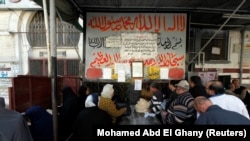On December 22, Egyptian President Abdel Fattah El-Sisi spoke about competition between the country’s state-owned and private companies while inaugurating a fuel production complex in upper Egypt’s Asyut governorate. Business ownership has become a growing controversy in Egypt with the country’s military-owned companies’ continued encroachment on the civilian economy.
In November, Naguib Sawiris, a 67-year-old Egyptian billionaire telecommunications tycoon, told AFP that competition between the private sector and military-owned companies is “unfair,” adding that "[c]ompanies that are government-owned or with the military don't pay taxes or customs.”
Ignoring the complains that private Egyptian companies face unfair competition, el-Sissi claimed that those companies are the ones working in the country.
“We say that Egyptian private companies are the ones that are working in Egypt, and I call these companies to invest in other fields,” el-Sissi said.
That is misleading.
Egypt’s army has played a role in the country’s economy for decades. However, experts, investigative journalists and human rights watchdogs say that since el-Sissi took power in 2013, the army’s hold on the civilian economy has grown to an unprecedented level.
In 2013, el-Sissi, formerly Egypt’s army chief, led a military coup that ousted the country’s first democratically elected president, Mohamed Morsi. In 2014, el-Sissi won presidential elections with 97% of the vote and the military’s blessings. International observers said the vote fell short of democratic standards.
Since then, military organizations, including the Egyptian Defense Ministry, Ministry of Military Production and the Egypt-based Arab Organization for Industrialization have expanded their business interests in Egypt.
Reuters reported in 2018 that military-run industries have transitioned from manufacturing armaments to making goods like medical devices, building greenhouses and even gyms. In 2016, el-Sissi signed into law legislation exempting military-owned companies and security institutions from paying value-added tax (VAT) on goods, equipment, services and raw materials needed for armaments, national security and defense.
Egypt’s Defense Ministry determines which goods and services are exempted from VAT, and local business people say this system is open to abuse.
Egypt’s army is the Arab world’s largest, and it enjoys the support of Saudi Arabia and the United Arab Emirates, which backed el-Sissi against the Muslim Brotherhood.
One megaproject is the construction of the New Administrative Capital, covering 170,000 acres 45km (28 miles) from Cairo with a cost of about $40 billion. The new capital will house Egyptian government buildings, embassies and businesses and accommodate about 6.5 million people.
The company in charge of the project is the Administrative Capital for Urban Development (ACUD), 51% of which is controlled by Egypt’s army, with the remaining 49% owned by Egypt’s Ministry of Housing. The military will be running and managing the project.
Egypt’s military will “reap enormous financial benefits from this ambitious endeavour. The ACUD, in which the military has the majority stake, is in charge of selling housing units in the new capital,” Mustafa Menshawy, a post-doctoral research fellow at the U.K.’s University of Lancaster, wrote in an op-ed published by Al Jazeera in July.
The Egyptian military’s growing control over the state and society is overwhelming the private sector and discouraging foreign investors, the Financial Times wrote in June.
“There are 60 companies affiliated to military entities operating in 19 of the 24 industries of the Global Industry Classification Standards, an industry taxonomy body, according to the World Bank report. The military’s National Service Projects Organization (NSPO) controls 32, a third of which were established after 2015,” the FT said.
Citing analysts, the FT added that el-Sissi fears Egyptian businessmen gaining political influence that could fuel an upheaval like the one that brought Morsi to power in 2012.
Timothy Kaldas, an independent risk adviser and nonresident fellow at the Tahrir Institute for Middle East Policy, wrote in a December 2020 Bloomberg op-ed that most of the contracts for Egypt’s megaprojects are funneled to military-owned companies, which in turn, subcontract private companies to do much of the work. The military determines which companies win the contracts and thereby ensures “their dependence on the government for access to state spending,” Kaldas wrote, adding: “Not only does control over the production and distribution of wealth allow the government to buy loyalty, it also prevents the emergence of any competition.”
In November 2020, Human Rights Watch, the Freedom Initiative and Cairo Institute for Human Rights sent a letter to the International Monetary Fund (IMF) after it approved a $5.2 billion loan to Egypt. The IMF accepted an Egyptian government report on state-owned enterprises (SOEs) that did not mention businesses owned by the Defense Ministry or the Ministry of Military Production.
The three NGOs urged the IMF Board to “insist that Egyptian authorities include military-owned businesses in all transparency requirements that apply to state-owned enterprises.”
Egypt has received $20 billion in IMF loans since 2016.
There are no official estimates of the size of private companies’ participation in Egypt’s economy. However, Egyptian Finance Minister Mohamed Maait announced in October that the government will increase the private sector’s participation in the economy to 50%.
Egypt’s Central Bank said economic growth in 2020-2021 reached 3.3%. In a Reuters poll, economists predict an annual urban consumer inflation to reach 6.0 percent in 2021-2022, but still under the Central Bank’s limits. Egypt's Central Agency for Public Mobilization and Statistics reported that unemployment rose to 7.5% in the third quarter of 2021, an increase of 0.2 percent from the second quarter.
In 2021, poverty decreased in Egypt to 29.3% compared with 32% in 2020, according to the website Statista, a provider of market and consumer data.





